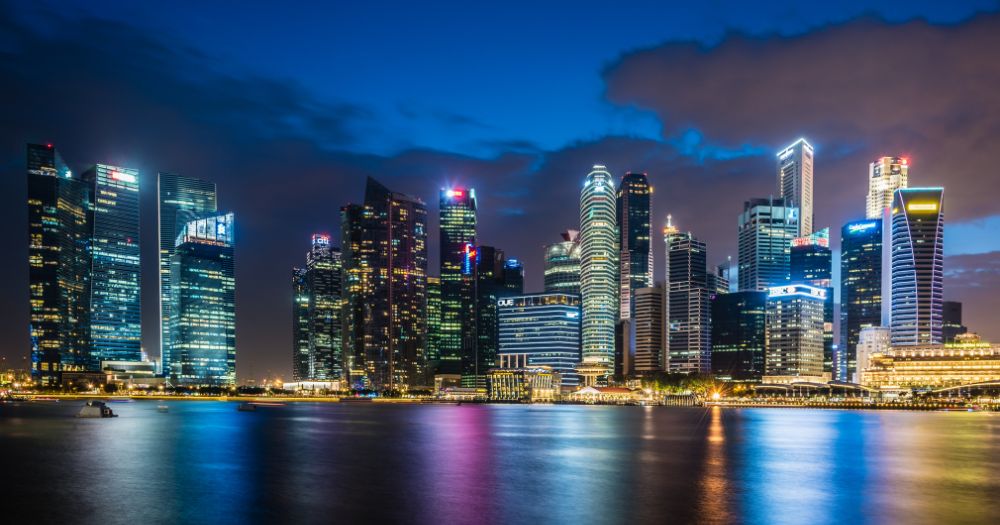Follow us on Telegram for the latest updates: https://t.me/mothership sg
Four Singapore government agencies jointly responded to a Bloomberg article, which reported that the Dutch wealth manager Van Lanschot Kempen NV had blacklisted Singapore-backed assets as it claimed the republic failed Kempen's updated ESG test.
ESG stands for environmental, social and governance. It is a metric used by investors to determine whether investments have a positive impact on society and the environment.
According to the article, Kempen was screening for environmental risks.
The National Climate Change Secretariat – Singapore (NCCS), the Ministry of Sustainability and the Environment (MSE), the Ministry of Trade and Industry (MTI) and the National Parks Board (NParks) responded to the article in a joint statement released on Jun. 15, 2023.
Senior executive claims S'poreans "used to not having to breathe natural air"
The Bloomberg report dated Jun. 9, 2023, quoted a senior executive at Kempen, saying that Singapore's biodiversity and climate are travelling in a "reverse" direction from "positive improvements" they "expect from quite advanced economies" and "even other regional economies that aren’t necessarily advanced".
He explained that he thinks Singapore is "falling behind due to its inefficient use of energy to protect the population from tropical heat".
He claimed that Singapore is "a very advanced economy in a place where it’s the norm to have air-conditioned everything".
He further alleged that it's not that Singaporeans "don't care" but because, from a "society perspective, it’s so hot there they’ve got used to walking from one end of the city to the other and not having to breathe natural air".
Bloomberg claims its research service found S'pore's reliance on renewables fell
Bloomberg opined in the article that "the decision marks a rare example of a developed economy falling out of favour with investors focused on environmental, social and governance scores".
It also highlighted that "Kempen's other exclusions affect assets from Russia, China and Saudi Arabia".
Bloomberg then pointed out that it's not the first time a "rich nation" had been affected by an ESG blacklist, raising an example, it claimed, of U.S. Treasuries blacklisted by the German state of Baden-Württemberg for America's failure to not ratify treaties in areas such as women's rights and controversial weapons.
Bloomberg cited an analysis by BloombergNEF, Bloomberg's primary research service, which claimed that Singapore’s reliance on renewables for its electricity fell from 4.08 per cent five years ago to 2.68 per cent in 2021.
BNEF also claimed that Singapore has weaker power transition policies compared to peers like Germany and the United States.
A Singapore-based analyst at BNEF told Bloomberg that Singapore “faces very unique circumstances for its energy transition” due to it being “land-scarce and resource-constrained” and has “a limited amount of renewable power generation capacity that it can build domestically".
Statement pointed out inaccuracy in article
In the joint statement, the authorities pointed out that it was inaccurate to say that the share of renewables in Singapore’s energy mix decreased between 2016 and 2021.
"On the contrary, the share of renewable energy (solar) has increased during this period, from 0.17 per cent to 0.71 per cent," said the statement.
Singapore's limited land area causes its lower share of renewables compared to other nations, it explained.
It added that Singapore’s Alternative Energy Disadvantaged status is officially recognised by the United Nations Framework Convention on Climate Change (UNFCCC).
The statement also mentioned that Singapore's share of coal -- "the most pollutive of fossil fuels" -- is only 1.2 per cent, far lower than in many countries.
Singapore takes climate action seriously
The agencies emphasised that Singapore "takes climate action seriously" and "invited" Kempen to learn more about Singapore's "firm commitments and concrete actions on sustainability".
It also laid out key steps it has taken towards achieving net zero emissions by 2050.
One such commitment is being the only country in Southeast Asia to implement a broad-based carbon tax.
The statement noted that the tax covers 80 per cent of Singapore’s greenhouse gas emissions, a higher proportion than in many countries "including in Europe".
Additionally, the tax applies to the first tonne of carbon emission and will be raised up to US$60 (S$80)/tCO2e by 2030.
Efforts to decarbonise and conserve biodiversity
"Notwithstanding its disadvantages, Singapore is committed to decarbonising its electricity generation," said the statement.
It touched on several initiatives to do so:
- Quadrupling solar panel deployment from 2021 and being on track to achieve a target solar energy share of 3 per cent by 2030
- Developing regional power grids to import low-carbon electricity, which will make up about 30 per cent of Singapore’s electricity supply by 2035
- Launching a strategy to develop hydrogen as a decarbonisation pathway, which can potentially support up to 50 per cent of Singapore's power supply by 2050.
The agencies also highlighted Singapore's commitment to the "conservation of its rich biodiversity", which has more than 2,000 plant species, 400 bird species, around 250 hard corals and 35 mangrove species.
They said Singapore accounts for almost a third of the world’s hard coral and half its mangrove species.
The statement also brought up the Nature Conservation Masterplan, which protects key terrestrial and marine habitats, as well as the discoveries of more than 120 new plant species in addition to the rediscoveries of 140 plant species previously thought extinct in recent years.
To strengthen the resilience of native biodiversity, Singapore has also put in place species recovery plans for more than 120 endemic, rare or threatened native plant and animal species, it added.
Related stories
Top image via Canva.
If you like what you read, follow us on Facebook, Instagram, Twitter and Telegram to get the latest updates.

